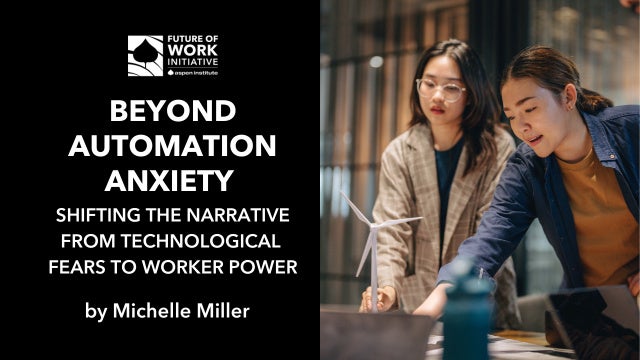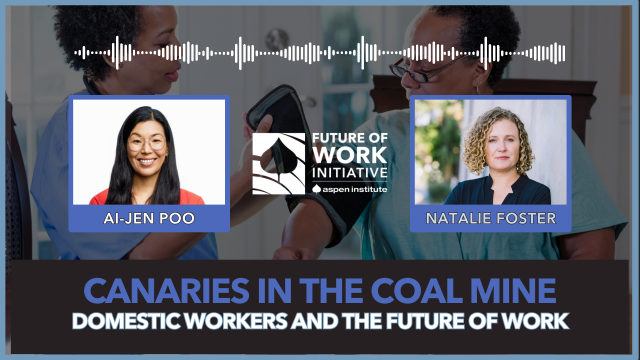Back to the Future of Work: Revisiting the Past and Shaping the Future
This series gathers insights from labor, business, academia, philanthropy, and think tanks to take stock of the past decade and attempt to divine what the next one has in store.

About This Series
When contemporary conversations on the “future of work” began a decade ago, most of the technologies that would define that term still resided comfortably in the realm of science fiction, or were only just emerging into public view — self-driving cars, artificial intelligence, and personal deliveries at the push of a button. Today, all these phenomena have come into their own, to varying degrees, and both regulators and commentators have sought to keep pace with what this means for our labor force. These developments have prompted a new and very different set of questions than the ones we confronted just ten years ago:
- What predictions did we get right?
- What did we get wrong?
- Who did we leave out of the conversation?
- How can technology transform work for the better?
- And what can we do to bring all stakeholders together to build a better future for all?
In this series, curated by the Aspen Institute Future of Work Initiative, we gather insights from labor, business, academia, philanthropy, and think tanks to take stock of the past decade and attempt to divine what the next one has in store. As the future is yet unwritten, let’s figure out what it takes to build a better future of work.
Contributors
Looking Back on the “Future of Work” (And What’s Next)
Natalie Foster – President and Co-Founder, Economic Security Project, and Senior Fellow, Future of Work Initiative, The Aspen Institute
Anmol Chaddha – Principal, Reimagining Capitalism, Omidyar Network, and Senior Fellow, Future of Work Initiative, The Aspen Institute
Worker Power in the Age of AI Monopolies: Why We Need Structural Solutions Now
Elizabeth Wilkins – President and CEO, The Roosevelt Institute
Power, Agency, & Autonomy: The Future of Worker Voice
April Verrett – President, Service Employees International Union (SEIU)
The Changing Face of Retirement and the Future of Work: Big Questions and Bold Solutions
Dylan Tyson – President, Retirement Strategies, and Head, Global Retirement Center of Excellence, Prudential Financial, Inc.
The Potential for Scaling Technology: Increased Labor Productivity…If We Get It Right
Asutosh Padhi – Senior Partner and Global Leader of Firm Strategy, McKinsey & Co., in conversation with Maureen Conway, Vice President, The Aspen Institute, and Executive Director, Economic Opportunities Program
The Future of Workers and AI: Control Over Workplace Activity is Key
Mary L. Gray – Senior Principal Researcher, Microsoft Research
Canaries in the Coal Mine: Domestic Workers and the Future of Work
Ai-jen Poo – President, National Domestic Workers Alliance, and Executive Director, Caring Across Generations, in conversation with Natalie Foster, President and Co-Founder, Economic Security Project, and Senior Fellow, Future of Work Initiative, The Aspen Institute
Beyond Automation Anxiety: Shifting the Narrative from Technological Fears to Worker Power
Michelle Miller – Director of Innovation, Center for Labor and a Just Economy, Harvard Law School
The Gig Economy’s Next Act: Balancing Flexibility and Security for Workers
David Risher – CEO, Lyft
Empowering the Workforce: Roy Bahat on the Future of Work
Roy Bahat – Head, Bloomberg Beta, and Chair, Aspen Business Roundtable on Organized Labor, in conversation with Nilesh Kavthekar, Workonomics
Artificial Intelligence, Human Intellectual Autonomy and the Future of Work
Arun Sundararajan – Harold Price Professor of Entrepreneurship and Director, Fubon Center for Technology Business and Innovation, NYU Stern School of Business
AI and the Future of Work(ers)
Don Howard – President and CEO, The James Irvine Foundation
About the Future of Work Initiative
The Aspen Institute’s Future of Work Initiative, part of the Economic Opportunities Program, empowers and equips leaders to innovate workplace structures, policies, and practices that renew rather than erode America’s social contract.
About the Economic Opportunities Program
The Aspen Institute Economic Opportunities Program advances strategies, policies, and ideas to help low- and moderate-income people thrive in a changing economy.
Join Our Mailing List
To receive occasional emails about our work — including new publications, commentary, events, fellowships, and more — join our mailing list.
Connect on Social Media
For news and updates every day, connect with us on the social media platform of your choice.













